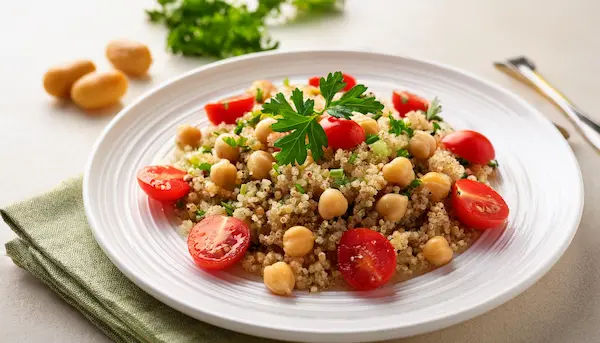Vitamin B1: Food Sources and Benefits
Explore the importance of Vitamin B1 (Thiamine), its top food sources, signs of deficiency, and practical tips to maintain healthy levels for better energy, nerve, and heart health.

Written by Dr. J T Hema Pratima
Reviewed by Dr. Rohinipriyanka Pondugula MBBS
Last updated on 11th Aug, 2025

Introduction
Vitamins are essential nutrients that keep our bodies functioning properly, and Vitamin B1 (Thiamine) is one of the most important among them. It plays a crucial role in converting food into energy, supporting nerve function, and maintaining a healthy heart. If you’ve been feeling unusually tired, weak, or experiencing muscle cramps, you might not be getting enough Vitamin B1 in your diet.
In this article, we’ll explore:
What is Vitamin B1?
Why is it important for your health?
Best food sources of Vitamin B1
Signs of deficiency
Tips to ensure you get enough Vitamin B1
What is Vitamin B1 (Thiamine)?
Vitamin B1, also known as Thiamine, is a water-soluble vitamin that helps your body turn carbohydrates into energy. It also supports proper nerve function and keeps your heart healthy. Since our bodies cannot produce Vitamin B1 on their own, we need to get it from food or supplements.
Why is Vitamin B1 Important?
1. Boosts Energy Levels – Thiamine helps convert food into energy, keeping you active and preventing fatigue.
2. Supports Brain Function – It plays a role in maintaining healthy brain cells and cognitive function.
3. Keeps the Nervous System Healthy – Thiamine is essential for nerve signaling and muscle function.
4. Promotes Heart Health – It helps regulate heart function and prevents complications like beriberi (a condition caused by severe deficiency).
5. Aids Digestion – It supports the digestive system by helping break down food efficiently.
Top Food Sources of Vitamin B1
The best way to get enough Vitamin B1 is through a balanced diet. Here are some rich food sources:
1. Whole Grains & Cereals
Brown rice
Whole wheat bread
Oats
Fortified breakfast cereals
2. Legumes & Beans
Black beans
Lentils
Peas
Soybeans
3. Nuts & Seeds
Sunflower seeds
Flaxseeds
Pistachios
Macadamia nuts
4. Meat & Fish
Pork (especially lean cuts)
Salmon
Tuna
Chicken
5. Vegetables & Fruits
Spinach
Oranges
Potatoes
Asparagus
Tip: Since Vitamin B1 is water-soluble, cooking methods like boiling can reduce its content. Opt for steaming or stir-frying to retain more nutrients.
Health Topic Carousel:
Doctor Speciality: General Practitioner
Text: Consult Top General Practitioner
Signs of Vitamin B1 Deficiency
A lack of Vitamin B1 can lead to fatigue, weakness, and even serious health issues like beriberi or Wernicke-Korsakoff syndrome (a brain disorder linked to alcohol abuse).
Common Symptoms of Deficiency:
Constant tiredness
Muscle weakness
Poor concentration & memory issues
Loss of appetite
Tingling or numbness in hands and feet
Mood changes (irritability, depression)
Who is at Risk?
People with alcohol dependence
Those with poor dietary habits
Individuals with digestive disorders (like Crohn’s disease)
Elderly adults with limited food intake
If you experience these symptoms, consult a doctor. A simple blood test can check your Vitamin B1 levels.
How to Ensure You Get Enough Vitamin B1?
1. Eat a Balanced Diet
Include whole grains, nuts, lean meats, and green vegetables in your meals.
2. Limit Alcohol & Processed Foods
Excessive alcohol can interfere with thiamine absorption. Processed foods often lack essential nutrients.
3. Consider Supplements (If Needed)
If you have a deficiency, your doctor may recommend Vitamin B1 supplements.
4. Regular Health Check-ups
If you’re at risk of deficiency, periodic blood tests can help monitor your levels.
When to See a Doctor?
If you experience:
Persistent fatigue
Unexplained muscle weakness
Memory problems
Numbness in limbs
It’s best to consult a healthcare professional. You can book a consultation or lab test through Apollo 24|7 to check your Vitamin B1 levels.
Health Topic Carousel:
Lab test: Vitamin B1 Test.
Text: Get Your Vitamin B12 level Checked now.
Final Thoughts
Vitamin B1 is a vital nutrient that keeps your energy levels up, supports brain function, and maintains heart health. By eating a balanced diet rich in whole grains, nuts, lean meats, and vegetables, you can easily meet your daily needs.
If you suspect a deficiency, don’t ignore the symptoms—early detection and treatment can prevent complications.
Health Topic Carousel:
Doctor Speciality: General Practitioner
Text: Consult Top General Practitioner



